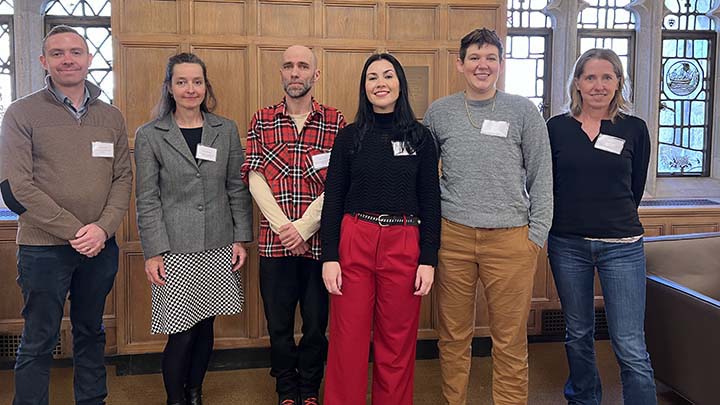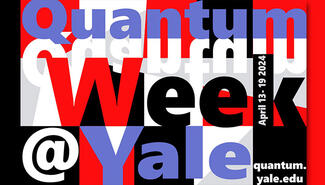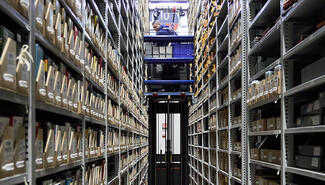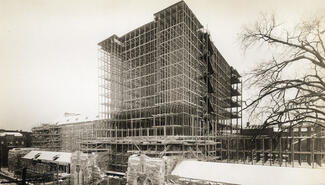Library Fellows present lightning talks on paper, poetry, protest, and more
Fellowship Program Director Jae Rossman invited six of this season’s residential fellows to share what they had been poring over in the Beinecke Library’s reading room. In March, the scholars delivered a series of five-minute lightning talks—illustrated with slide shows—to an audience gathered in Sterling Memorial Library lecture hall. Topics ranged from nuclear poetry, sound poetry, and writing paper to abolitionists and revolutionary thought. Images included typewritten poems, historic newspaper clippings, and photographs of desert landscapes.
These 6 scholars are among this year’s 55 recipients of Beinecke Library Research Fellowships the library welcomed to campus. The short-term, residential fellowships are open to academic and independent scholars throughout the world who wish to pursue traditional methods of archival and bibliographic research in Yale Library special collections and also to those who wish to pursue creative, interdisciplinary, and nontraditional approaches to conducting research.
Daisy Atterbury: Atterbury, who holds an MFA in Writing from Bard College, addresses the intersections of gender, race, sexuality, and coloniality in 20th- and 21st-century poetry and poetics. Atterbury grew up in Shiprock, New Mexico, near abandoned U.S. Department of Defense uranium mill and mine sites. This experience led to Atterbury’s interest in nuclear history. They are completing a doctoral dissertation at The Graduate Center, City University of New York, titled “There’s No Space in History: Affiliation, Eros, and Colonial Entanglements in North American Nuclear Poetry, 1945–present.” The papers of Mei-mei Berssenbrugge, Maureen Owen, Harvey Shapiro, Arthur Sze, and Gerald Vizenor (including documents only accessible at Yale concerning his experimental novel Hiroshima Bugi: Atamu 57) were the focus of Atterbury’s research at the Beinecke.
Benjamin Fagan: Fagan, associate professor of English at Auburn University, has written widely on the topic of the early Black press in America. An elected lifetime member of the American Antiquarian Society, Fagan’s current research is for the planned publication “The World of Frederick Douglass’s Newspapers,” the first monograph to explore the full range of periodicals that Douglass edited over the course of nearly three decades: The North Star (1847–51), Frederick Douglass’ Paper (1851–60), Douglass’ Monthly (1858–63), and the New National Era (1870–74). Douglass was one of the most significant social reform leaders of his era and one of the most influential newspaper editors of the19th century. Douglass himself considered his newspaper work among his most important accomplishments, yet that work has not been widely studied.
Nuno Neves: Neves holds a PhD in Materialities Literature and is a postdoctoral researcher in the Digital Mediation and Materialities of Literature Research Group at the Centre for Portuguese Literature at the University of Coimbra, Portugal. He is affiliated with several additional research projects, including Vox Media: Voice in Literature and MATLIT LAB: Humanities Laboratory, both at the University of Coimbra, and Contemporary Poetry and Politics: Social Conflicts and Poetic Dialogism (POEPOLIT II) at the University of Vigo, Spain. To support his current project, titled “The Letters of Sound Poetry: Production, Circulation, and Reception Networks,” Neves worked in the archives of the French poet Henri Chopin, the Italian poet Sarenco, and French artist and poet Gil J. Wolman—major figures in poetic experimentalism in the second half of the 20th century. In examining their correspondence among themselves and with other poets, Neves set out to identify and map transnational networks of sound-poetry collaborations and dissemination.
Joyce Karine de Sá Souza: De Sá Souza holds a PhD in Law and Justice from the Federal University of Minas Gerais, Brazil. Her research focuses on law, philosophy, and politics—especially the investigation of normativity and violence, spectacle and alienation, and the fundamentals of law, democracy, human rights, and the concept of “state of exception.” She came to Yale to work with the papers of the Tunisian author and social critic Mustapha Khayati, an important voice during the 1960s in Situationist International (SI), a group of avant-garde artists and revolutionary thinkers and the subject of de Sá Souza’s book in progress. Mustapha was the primary author of the French pamphlet De la misere en milieu etudiant (On the Poverty of Student Life), published by University of Strasbourg students and the SI in 1966, which fueled civil unrest throughout France in 1968.
Alice Stašková: Stašková is professor of German literature at the Friedrich Schiller University of Jena. Her completed research project will be the first systematic, historical investigation of The Philosophy of “As If” by Hans Vaihinger, published in 1911. Vaihinger proposes that, in order to live, mankind willingly accepts certain assumptions—”theoretical, practical, and religious fictions”—as reality. His ideas were influential worldwide in the fields of philosophy, literature, art, literary and cultural theory from the early 20th century into the present day. To support her project, Stašková conducted research in the papers of Vaihinger’s contemporaries, the modernist fiction writer Hermann Broch and the philosopher Ernst Cassirer.
Heather Wolfe: For her book project, “Paper Matters: Writing Paper in Shakespeare’s England,” Wolfe examined materials in the Osborn Collection, a collection of early modern British literary and historical manuscripts. She studied watermarks on sheets of correspondence from the 16th and early 17th centuries, which enabled her to identify papers made in Venice, Frankfurt, and England. Wolfe, who is curator of manuscripts and associate librarian at the Folger Shakespeare Library in Washington, has published widely on the materiality of early modern English manuscripts, letter-writing practices, and hybrid books. She also teaches paleography for the Folger Institute and Rare Book School.
The application period for 2024–25 fellowships will open this summer.
Read more about the Yale Library fellowships at the Beinecke Rare Book and Manuscript Library and about the research projects presented by the 2021–22 fellows.
Image: Library research fellows (left to right): Benjamin Fagan, Alice Stašková, Nuno Neves, Joyce Karine de Sá Souza, Daisy Atterbury, Heather Wolfe. Photo by Jae Rossman.



